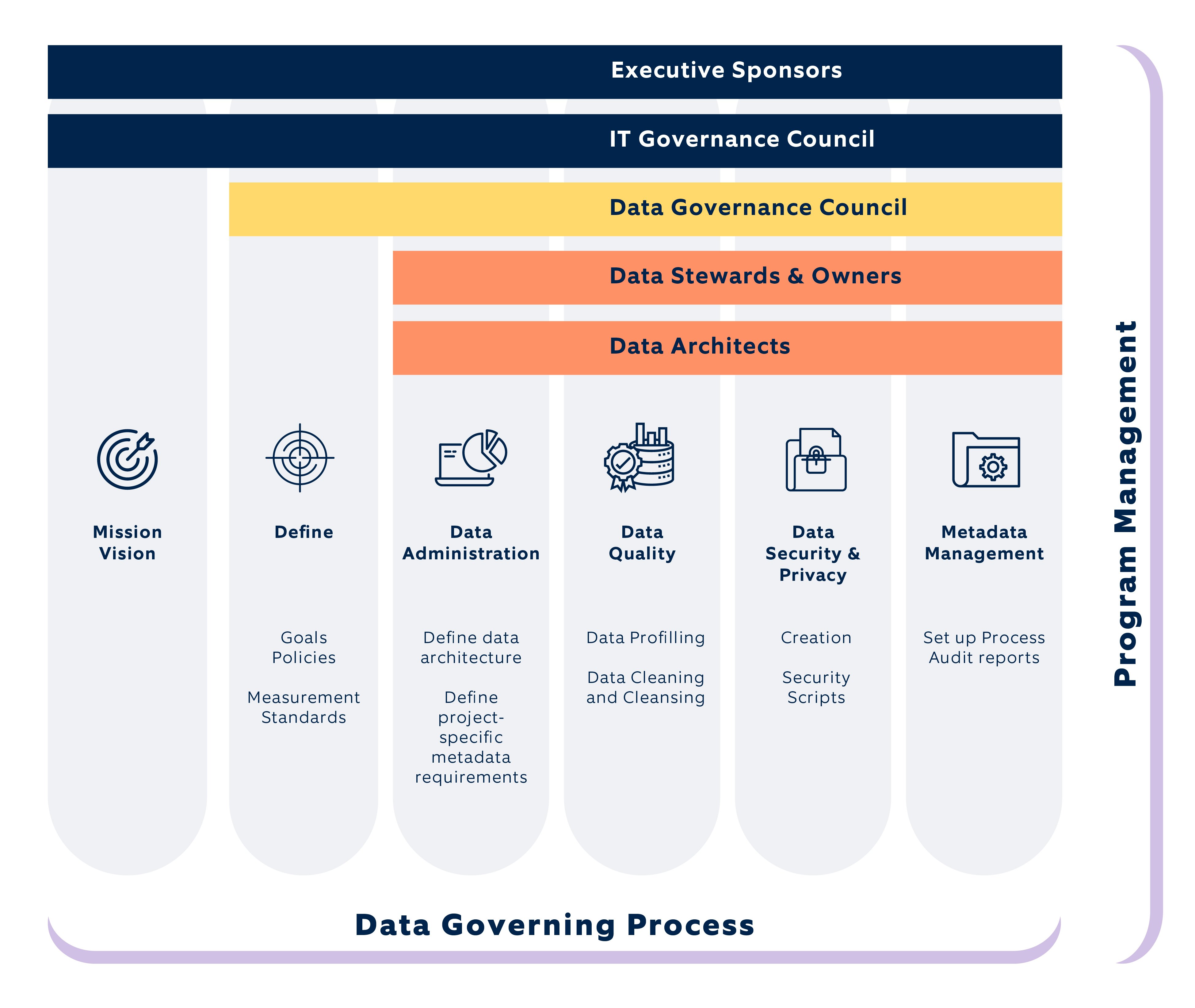Hospitals generate a massive amount of data worldwide, but according to the World Economic Forum's (WEF) 2019 report, remarkably, 97% of this data (WEF) — is not used!
The WEF report states that, on average, hospitals produce 50 petabytes of data every year. A petabyte corresponds to approximately 500 billion pages of standard printed text. This hoard of information includes medical, financial, and operational data.
Knowing the potential of this data, hospitals and healthcare organizations are eager to explore how they could unlock its potential. This is where data governance comes in.
An optimal framework to manage data
How can data governance help? Data governance is a system implemented within an organization to decide the authority and control over data assets. It includes people, processes, and technologies that ensure data is handled appropriately across the organization.
Hospitals and healthcare firms deal with large volumes of sensitive data, have complex regulations, and often operate in silos. Data governance helps healthcare organizations unlock the value of their data to power data-driven decision-making. Decisions around patient care or diagnosis are based on available data, and data governance ensures that the data is correct and trust worthy.
The challenge, however, isn't the data volume but the integrity and quality of that data.
Data, data everywhere!
There has been a significant increase in the healthcare data volume worldwide, especially in the past two years, during the pandemic.
According to an RBC Capital Markets report, today's healthcare industry generates around 30% of the world's data volume. It also projects that by 2025, thanks to the digital revolution in healthcare, the compound annual growth rate (CAGR) of data for healthcare will be even more than in sectors such as manufacturing, financial services, and media and entertainment.
This makes data quality a major concern for many healthcare companies. While there is high demand for healthcare data, the challenge lies in organizing it well enough to be used effectively. Even if you have an ocean of information, it cannot quench your thirst for valuable and relevant information unless you have data governance, making the ocean water drinkable.
Companies usually store and maintain data on various database systems and platforms. Generally, they do not create organization-wide solutions for data management. This can result in duplication of efforts in data maintenance, unnecessary storage costs, and under-utilization because data is not formatted to solve organizational problems or provide intelligent insights for decision-making.
Processes and policies to manage data
Implementing a robust data governance policy will make it easier for an organization to take control of its data and derive value from it.
Just as any company implements processes and policies to complete projects or provide services, it also requires another framework of processes and policies to manage the data created from these interactions. Since data comes from multiple functions and departments, it must have a holistic view, and an organization-wide reach. This is imperative to ensure that all data points communicate requirements and guarantee accessibility.
Strategic guidelines
The company should set up a Data Governance Office (DGO) comprising key employees supported by the top leadership. It is important to have executive buy-in and begin with communication from the top.
The DGO team should include subject matter experts, business owners, people who use the data, and those who maintain data within the organization.

Core components
The core components of a successful data governance program include:
- people
- data processes
- policies and strategy
- data security
- metrics
- data governance technology
The company should appoint a Data Steward responsible for the management and proficiency of data stored in the organization.
Data stewardship practices ensure that the organization's data remains safe and accessible.
The framework must have a strategy for data quality. Poor data quality can result in poor decision-making, especially in healthcare. A comprehensive data quality system provides guidelines to tackle areas of concern, implement improvements, and establish continuous monitoring.
One of the most essential components of the data governance framework is data security. All stakeholders must ensure that standard security guidelines are adopted, followed, monitored, and always improved upon.
The Data Governance Council must manage and execute the application lifecycle activities (development, maintenance, evaluation, and implementation) of all information systems to regulate their impact on the firm's data integrity.
Metadata management policies and procedures ensure consistency in policies, along with clear communication in case of any changes.
Data can create value and foster innovation
Healthcare companies must manage different kinds of sensitive user data. Data governance programs can manage healthcare data with clarity and consistency.
Soon, the innovations in healthcare technologies, developments in population health management, and healthcare delivery initiatives led by federal mandates will make data governance programs indispensable and essential for stable business operations.
Closing thoughts
Data governance offers healthcare firms greater control over data and helps handle it efficiently. Such data can also help business leaders make more effective decisions.
Since data is generated exponentially, data governance is a credible and essential framework to manage it. A comprehensive data governance program is necessary to ensure efficient and stable business operations.
Do you want to derive more value from your data assets? Our experts can help you get started on your data governance journey. Explore our offerings in the Life Sciences domain and connect with us today!





